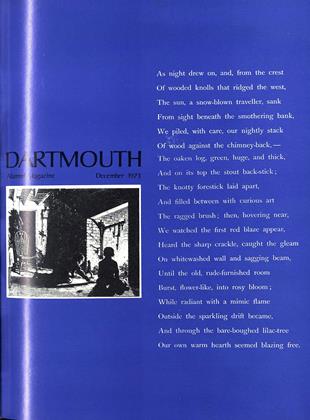FROM NOON TILL THREE: THE POSSIBLY TRUE AND CERTAINLY TRAGIC STORY OF AN OUTLAW AND A LADY WHOSE LOVE KNEW NO BOUNDS.
December 1973 CAROLE BERNTSEN BERGERFROM NOON TILL THREE: THE POSSIBLY TRUE AND CERTAINLY TRAGIC STORY OF AN OUTLAW AND A LADY WHOSE LOVE KNEW NO BOUNDS. CAROLE BERNTSEN BERGER December 1973
By Frank D. Gilroy '50. GardenCity, New York: Doubleday & Company,Inc., 1973. 116 pp. $4.95.
Western buffs and other romantics can expect to be delighted and dismayed by Gilroy's novel; tough-minded, skeptical types will likely ex- perience these reactions in reverse sequence. All of Gilroy's readers will be teased into a closer look at their notions about truth and fiction.
The first half of the novel consists of a Letter to the Editor written in 1881 by a comely window in Gladstone City, Wyoming. The lady. Amanda Starbuck, tells of her encounter with a dashing outlaw named Graham Dorsey, who is forced, on account of a lame horse, to stay at her house while his gang robs a nearby bank. Amanda's thrilling account of the "lifetime they lived from noon till three," when Dorsey is shot dead by a posse, rapidly escalates into one of those legends for which the West is justly famous.
The second half of the book provides, in the form of some stenographed notes discovered in a Kansas City attic in 1973, the contrasting (and possibly true) version of Graham Dorsey himself (maybe). Dorsey depicts himself as "a sidewinding faker and a shit," who finds himself replaced and finally martyred by his public image (a fate as certainly "relevant" as it is tragic)
The reader is left to decide for himself which of these conflicting accounts is the "true" one The novel itself, presented with witty mendacity as a collection of real documents, requires no apology, for, as the "publisher" remarks. "If you can't believe fiction, what can you believe?"
Like a great many novels these days, FromNoon Till Three seems to have been written either under the esthetic influence of film or with an eye to screen adaptation. One problem with such books is that they rarely even begin to realize those expressive possibilities unique to the novel form. As much as they may please the armchair film-maker (one can't help but make the film as one reads), their characteristic leanness - in terms of length, range and verbal texture - tends to leave the novel-lover a bit hungry. Such quibbles aside, one is grateful for this shrewd and lively book, quite as much fun to read as it must have been to write.
Mrs. Berger, awarded a Ph.D. from theUniversity of California at Berkeley in 1971. is Assistant Professor of English, DartmourdCollege. She teaches courses in the 18th Centun.Novel and Novel and Play into Film.
 View Full Issue
View Full Issue
More From This Issue
-
 Feature
FeatureWHY COLLEGE ?
December 1973 -
 Feature
FeatureWatergate and the Press
December 1973 By H. WILLIAM SHURE -
 Feature
FeatureMiSSING IDOL:KOM AGAIN?
December 1973 By MICHAEL STUART '71 -
 Feature
FeaturePoet of Place
December 1973 By R.B.G. -
 Article
ArticleBig Green Teams
December 1973 By JACK DEGANGE -
 Article
ArticleMILLETT G. MORGAN
December 1973 By R.B.G.
Books
-
 Books
BooksQuestions on the Principles of Economics
January 1916 -
 Books
BooksTallulah to Travolta
November 1978 By JOHN FINCH -
 Books
BooksLAUGHTER AND TEARS.
FEBRUARY 1972 By JOHN HURD '21 -
 Books
BooksNOTES FROM THE DIASPORA.
June 1962 By ROBERT G. HUNTER -
 Books
BooksFRANK PEARCE STURM. HIS LIFE, LETTERS, AND COLLECTED WORK.
OCTOBER 1969 By ROBERT H. ROSS '38 -
 Books
BooksRUDOLPH THE RED-NOSED REINDEER SHINES AGAIN.
November 1954 By SIDNEY C. HAYWARD '26

